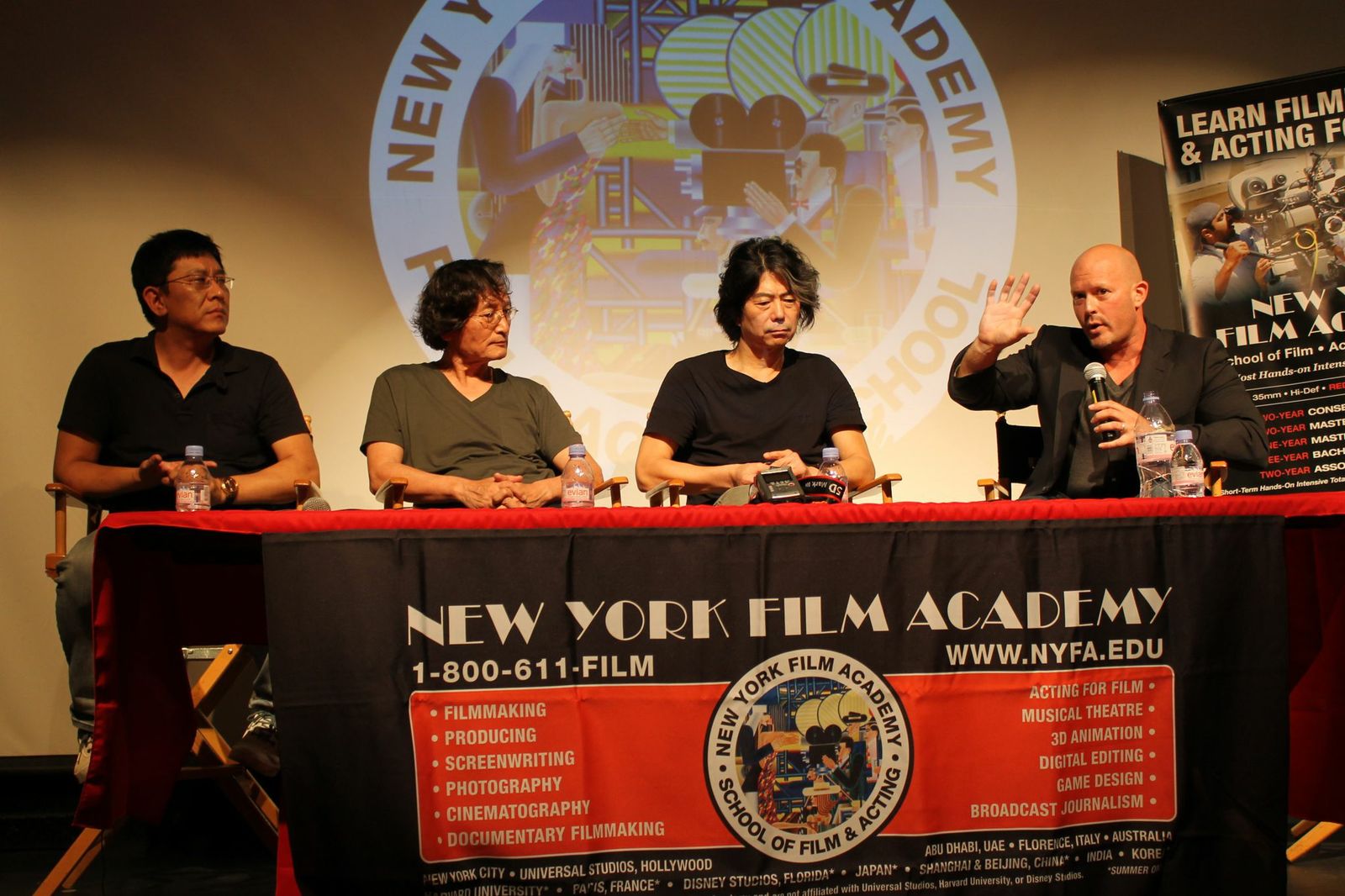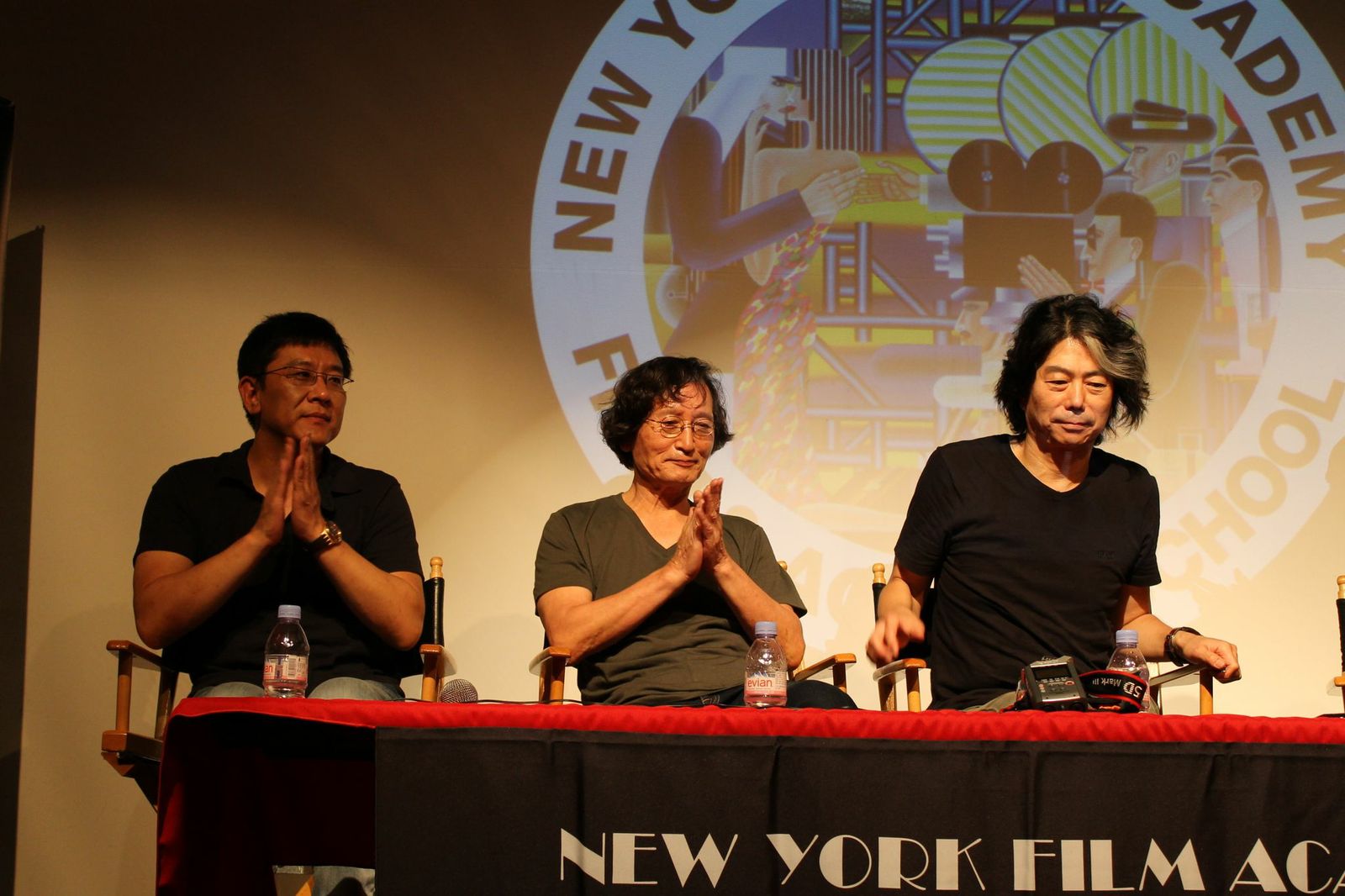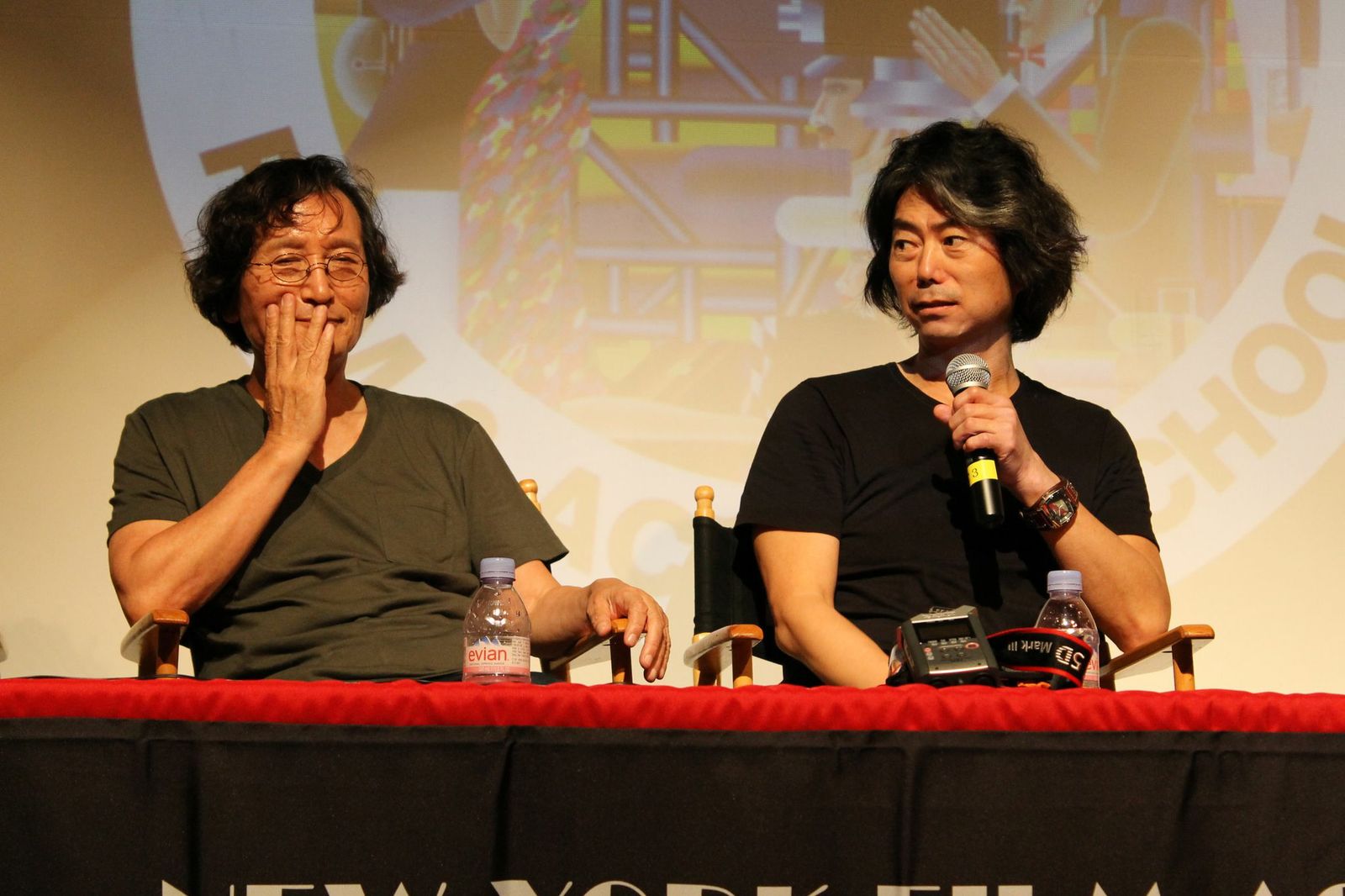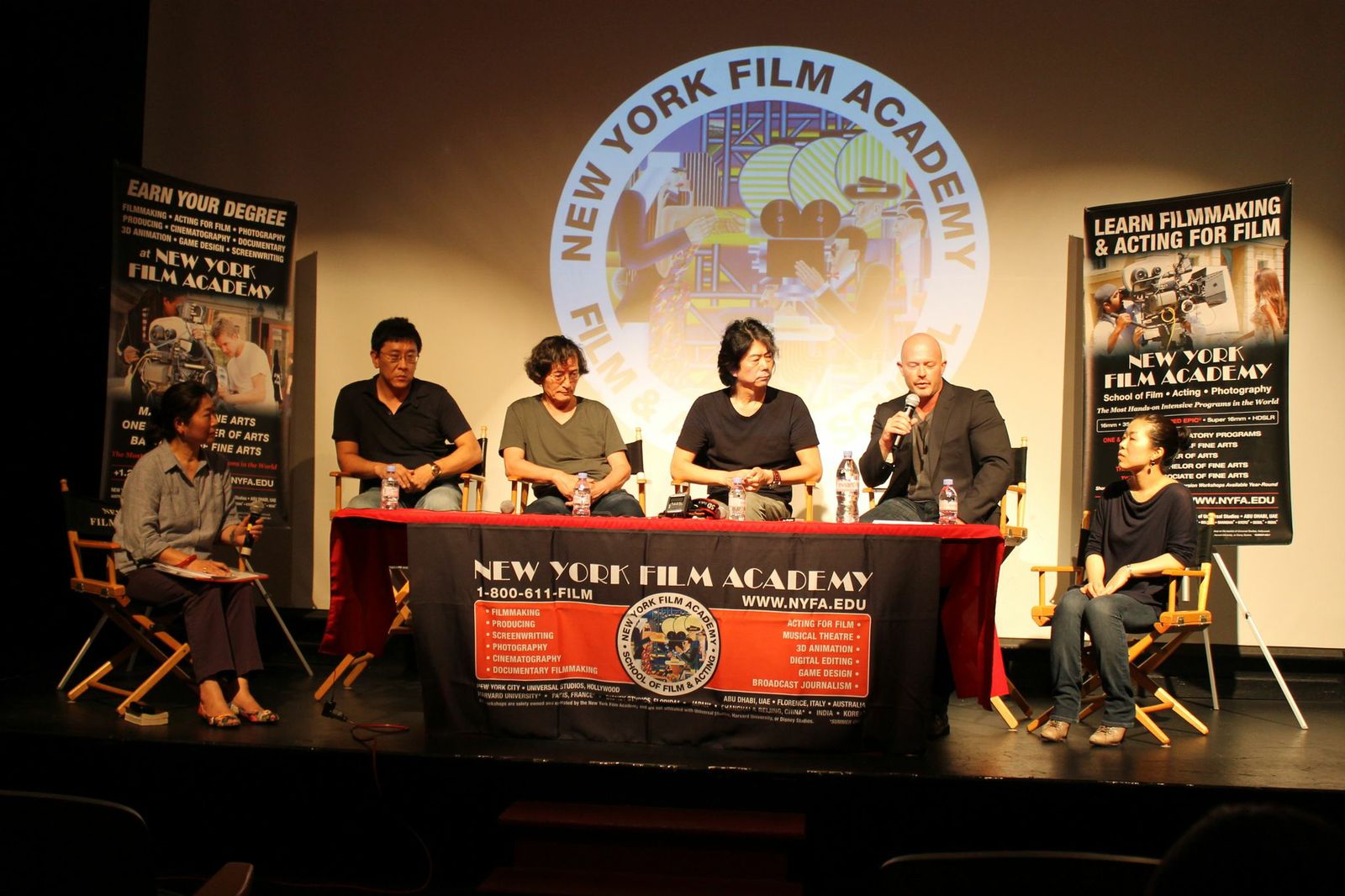By William Kustiono & Michelle Xia
The Korea Society and MoMA (The Museum of Modern Art) collaborated to co-present ‘ContemporAsian: Focus on Korea.’ On Thursday, August 8th 2013, the Korea Society and New York Film Academy hosted and arranged a press conference for the exhibit and invited three directors from Korea. ‘ContemporAsian’ is an exhibit that presents contemporary Asian films from pan-Asian countries. The series selected were powerful Korean films, highlighting current social issues, injustice and human nature. This special exhibit lasted from August 5th to August 11th 2013. The films show characteristic narrative skills from some of Korea’s most intuitive and pervasive filmmakers. The Korean directors presented at this press conference were: Chung J-young (National Security), Lee Ji-seung (Azooma) and Jeon Soo-il( El Condo Pasa).
The first director introduced was Chung Ji-Young. Director Chung started his career by working as an assistant director to filmmaker Kim Soo-yong. Chung’s first film debut was an erotic mystery, “The Mist Whispers like a Woman.” He started with melodrama films, but moved on to more politically alleged films. His latest famous work is “National Security” (2012), a film based on the true story of a Korean activist who was kidnapped and tortured by national police inspector for 22 days in 1985 during the Chun Doo-hwan regime, Kim Geun-tae.
The second director introduced was Lee Ji-seung. Lee’s father owns a film production company, Taehung Pictures, famous for IM Kwon-taek’s ‘Sopyonje’, and ‘Strokes of Fire’. Lee completed his MA in cinema studies at New York University. His first film as a director is “Azooma”. “Azooma” is a 2013 South Korean film starring Jang Young-nam as a mother seeking justice for the rape of her ten-year old daughter.
The third director introduced was Jeon Soo-il. Jeon is a graduate student of Kyungsung University in Busan majoring in theatre & film. He made an independent film organization ‘Dongnyuk’ based in Busan. His movie, El Condor Pasa, was presented in the ‘ContermporAsian’, a movie starring Gang Ye-won as Soo Ha, who suddenly quits her job at a company and leaves with a cactus that resembles her. She goes to a rest stop area that her father left for her. While working at the rest stop area, she meets strangers and the cactus grows as a person.
David Klein, the Senior Director of the New York Film Academy, commenced the conference by acknowledging the Korean directors for their works showcased in the new section of MoMA. Klein asked each director how they dealt with the actors who had to enact the different haunting and evocative scenes. Each director mentioned their hardship during the making of the film and how it was such a heartbreaking process. Director Chung responded on how he hoped the audience would connect and understand the protagonist in his film. To have someone push down on your beliefs and be tortured by the government for it, Director Chung wanted every single moment to be felt by the audience. Chung felt guilty forcing and pushing his actors to be exposed to this topic and be tortured endlessly. Director Lee concentrated his film on youth sexual molestation. His work transpired from a true story that occurred ten years ago. He casted young actors and had them act separately so they would not have to be exposed to the trauma. He would then edit the scenes together and make it into the film he has today. Each director mentioned their hardship during the making of the film and how it was such a heartbreaking process.
During the panel discussion, the directors explained how they wanted their movies to impact the audience. Pain and sexual abuse are involved and it may be difficult for the audience to see. The films are not easy to watch because there are many scenes and emotions portrayed. Director Chun explained that he wants to inform the audience of the reality of human torture happening in South Korea, just as it has happened to the late Ministry of Health, Kim Geun-tae, who was an activist during the Chun Doo-hwan regime. The national police inspector tortured him and Chun wanted the audience to feel the torture and detention Kim suffered. His movie, National Security, has emotional scenes, especially during the torture and interrogation that may affect each viewer differently. He finds it difficult to re-enact the torture scene, and painful to see it happen to his cast. His film actor, Park Won-sang played Kim Jong-tae, the captured activist who is against the military dictatorship of Chun Doo-hwan. Chun remembers the difficulty of shooting the torture scene and it reminded Park the importance of it and to do his best act as a tortured person in the prison.
The directors on the panel mentioned how they changed the film’s production because of new and different ideas. Director Lee stated out that he created the ending of “Azooma”, as a surprise for the audience because he felt that criminals are often freed after they go to jail. Therefore, he created his ‘special’ ending for the audience to enjoy the film. Director Jeon’s film, ‘El Condor Pasa’ is also based on a true story. He changes his movie halfway through because of what he felt when he was directing the film.
The discussion left filmmakers and audience more intrigued with the director and their works. Some of the questions asked were about the technique needed to create such a beautiful and astounding movie. Another was the director’s preference in filming with digital or film. Director Lee and Director Chung claimed that although film is better in terms of quality, digital is easier to organize and inexpensive. Director Jeon has already created seven short films using films and plans on sticking to film in the future because he pursues for quality of the product.
Each director gave their ending comments with upcoming projects and wishes. Director Lee is considering a comedic movie set in the late 1980s. Director Chung is looking forward to capture the Korean history during the US military occupation after the war with Japan. Director Jeon is currently searching for an inspiration and is eager to create more films. Overall, the directors are happy to see their movie screened and introduced in the ‘ContemporAsian’. Introducing new ideas and spreading culture awareness, Asian cinema brings the new culture from the east, adding to the culture diversity and dynamic in New York City. MoMa provided this opportunity for Korean directors to share their work in NYC. The directors hope the audience enjoys the showcased movies and ask for their continued support in their future works. For more: http://www.moma.org




Leave a Reply